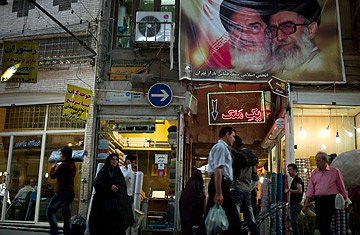
Shoppers in Tehran's Bazaar, while this traditional shopping centre has lost ground to modern day shopping malls, it continues to be the nerve cenrte of Iran's economy. Wholetraders, middlemen and importers all have their offices here, above shops selling rugs, chinese made socks and home appliances.
On Tehran's western outskirts is Iran's first and only wholesale supermarket--a kind of Persian Walmart-Costco hybrid. Women push giant carts around on gleaming white floors, past rows of the latest Apple computers and Sony flat-screen televisions--perhaps contraband, perhaps fakes. They sift through racks stuffed with designer clothes and stock up on everything from Norwegian salmon to Old Spice cologne. Except for the chadors, this could be any suburb in the U.S.
Can this be the capital of a country suffering under the toughest sanctions in modern history? Shelves are stocked with everything from Crocs to Louis Vuitton bags. Construction is everywhere. Restaurants are packed. Even Tehran's slums boast crops of satellite dishes and newer-model cars. "What did you expect?" asked one clearly prosperous store manager with a laugh. "Osama bin Laden at the airport with a shotgun?"
But the prosperity is largely an illusion. Ever since President Barack Obama's overtures for direct diplomacy with Iran were rebuffed, the Administration has succeeded in persuading its European and Asian allies to go along with severe sanctions aimed at forcing Iran back to the negotiating table. The results have been dramatic. Iran's currency has been devalued by more than 50%, and by U.S. estimates, Iranian oil exports have decreased by 45%. Some economists believe Iran is suffering from an annual inflation rate above 50%, double the Iranian government's estimate. U.S. officials are quick to claim credit. David Cohen, the Under Secretary at the Treasury Department responsible for squeezing Iran, says that "there are reverberations through the Iranian economy as we have broadened and intensified the sanctions."
Iran's ability to maintain the appearance of economic health may help determine whether there will be a new and destabilizing war in the Middle East. Iran is a decade into a determined effort to become a nuclear power. If U.S. sanctions don't force Iran's leaders to comply with international demands to prove their program is peaceful, Israel has said it will take military action to destroy it. As Tehranis go about their lives, their government shows no signs of backing down. A report in August from the International Atomic Energy Agency (IAEA) found that Iran has doubled its uranium refinement at an underground facility near Fordow, a virtually bombproof site that Western powers have insisted Iran shut down as part of a deal to end sanctions. International diplomacy has stalled. And politicians in Israel are openly debating bombing Iran's nuclear sites, possibly even before the U.S. presidential election in early November.
What I saw on a rare six-day trip to Iran suggests that sanctions are biting. The country has all but stopped issuing credible economic data in order to hide the depth of the distress. Everyone from the butcher to the industrialist will say that beneath the surface they are months from economic collapse. But even economic catastrophe may not be enough to stop Tehran's ruling mullahs from going nuclear.
